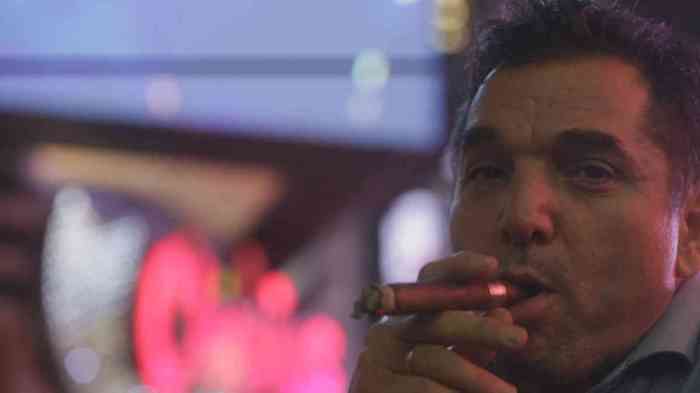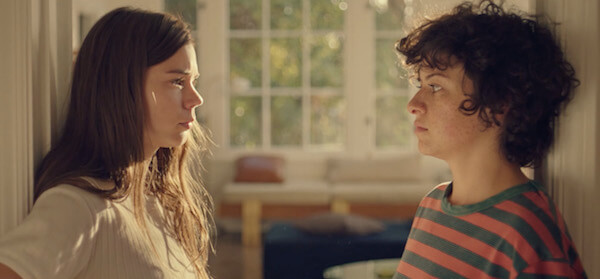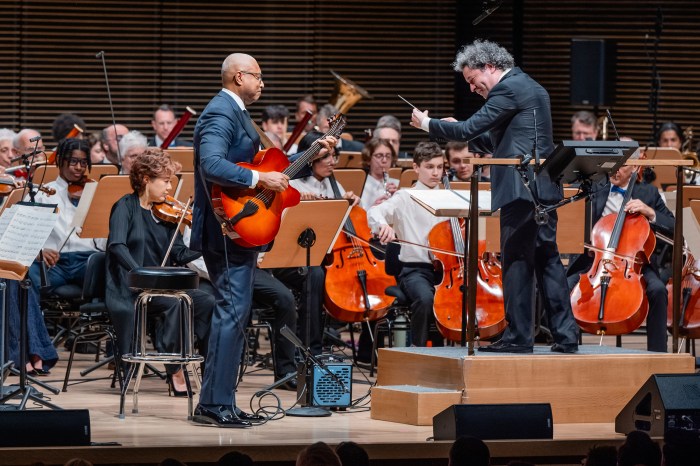This year’s Tribeca Film Festival is offering dozens of notable features, documentaries, and shorts by, for, and about the LGBTQ community through June 26 online. Here is a rundown of several offerings from this year’s program, all of which should be available virtually for streaming.
“Three Headed Beast”
The exceptional feature debut, “Three Headed Beast,” chronicles an open relationship of a bisexual couple almost entirely without dialogue. This is not a gimmick; writer/directors Fernando Andrés and Tyler Rugh let the lack of conversation between Peter (Jacob Schatz), Nina (Dani Hurtado), his partner of eight years, and Alex (Cody Shook) his new boyfriend, express their desires, regrets, anger, and jealousy. And it is all masterfully performed by cast members who reveal so much feeling with just a look or a gesture — as when Peter tries to get Alex to stop playing footsie in public.
“Three Headed Beast” is also cleverly edited to generate real meaning. When Peter shows Alex a photo of the dog that he and Nina have adopted, it is a symbol of the couple’s renewed commitment. The film’s distinctive narrative approach allows viewers to reflect on things untold — such as when and how Peter and Alex met. This stylish and sexy film is also full of emotion. A scene of the guys dancing together in their underwear is full of joy and eroticism, and a later scene featuring a character crying in despair is undeniably moving.
“Three Headed Beast” provides an apt commentary on communication in this digital age, and the filmmakers’ observations about marriage, monogamy, open relationships, and bisexuality will prompt considerable discussion. Don’t miss this gem. Andrés is a talent to watch.
“All Man: The International Male Story”
This zippy documentary, narrated by out gay actor Matt Bomer, recounts the history of the male—er, mail—order magazine/catalog that featured masculine guys modeling non-masculine outfits. The “magalog” appealed to both straight men’s aspirations as well as gay men who — ahem, appreciated — the handsome guys. (Scissor Sisters’ Jake Shears candidly reveals his use for toilet paper whenever a new issue arrived.)
“International Male” was the brainchild of Gene Burkard, a gay man, who sold a “lifestyle” and caught a wave —only to be disrupted first by the AIDS epidemic, then by selling out to Hanover Direct, who mainstreamed the brand. “All Man” features interviews with employees, several male models, fashion experts, and gay celebrities who acknowledge the impact of this “cash cow parody.” While it couldn’t be taken too seriously, IM earned serious money, and was often showcased in pop culture, from “Seinfeld” to “Zoolander.” It may have been selling sex, but as “All Man” shows, its value-added benefit was providing an outlet for gay men to look at men.
“Petit Mal”
“Petit Mal” is an interesting hybrid documentary/fiction about a throuple — Marti (Silvia Varón), Anto (Anta María Otálora) and Laia (writer/director Ruth Caudeli). The strong bond among these three lovers is felt in the opening scenes of them sharing paella and playing word games. However, when Laia goes off for a job, Marti and Anto are bereft. The film shifts into black and white to convey their loneliness — Anto performs a poignant song — and calls with Laia freeze or are dropped. Laia cries and misses her girlfriends when they do connect. “Petit Mal” artfully examines the difficulties of maintaining an equilateral balance in the relationship especially as Marti and Anto become closer during Laia’s absence. When they grow angry with Laia for failing to respond to their messages, there is noticeable silence when Laia returns from her trip. “Petit Mal” examines the singular dynamic of this throuple, and it is hard not to root for them to stay together — if only because they all look so adorable in their matching bear sleepwear.
“A Matter of Trust”
“A Matter of Trust” is a fantastic Danish film that intercuts five stories, each one absorbing. The sole queer entry has Emil (Emil Aron Dorph) shamed at school for sending a dick pic to a male classmate. When his teacher (Anders Brink Madsen) meets him later, he tries bonding with Emil — but crosses a line. Almost all of the main characters in “A Matter of Trust” do something risky or inappropriate and each segment is both provocative and revealing. The acting by the entire ensemble is uniformly strong and the film packs a wallop.
“Blessed Boys”
The passable time-filler, “Blessed Boys,” traverses the familiar territory of a gay teen in love with his best friend. Set in contemporary Naples, the film opens with Annaluce (Sofia Guastaferro) performing the miracle of bringing a dead dove back to life. She becomes a Saint in the village after saving her mother, Perla (Pina Di Gennaro), from dying. However, Annaluce’s brother, Lino (Francesco Pellegrino) is mostly put off — and put out — by his apartment becoming a holy site. He spends his free time with his best friend Mario (Vincenzo Antonucci), and there is considerable homoeroticism between the guys as they hug and have shared sexual experiences with both women and men. But Lino is clueless that Mario is in utterly in love with him. “Blessed Boys” juxtaposes these two storylines and features moments of intense devotion and passion, but this heavy-handed feature debut, directed and cowritten by Silvia Burnelli, never quite achieves a level of grace.
“The House of LaBeija”
Screening in the shorts program, “New York Keeping It Real,” “The House of LaBeija” features letters of pride, support, discovery and encouragement as read by various members of the Ballroom scene. In this stylish film by Fredgy Noël, various members of the House posing and voguing as self-affirming letters about resilience and being a role model are read in voiceover. It’s a terrific tribute to the members of this chosen family.
“Life Rendered”
In the shorts program, “Head Space,” the heartfelt animated/live action entry, “Life Rendered,” has Mark (Owen Teague) envisioning a romantic scenario in VR while grappling with the everyday reality of caring for his disabled father (Luce Rains), who is unaware that his son is gay. The story crosscuts between these two worlds, adding layers of meaning and emotion, as a father and son have separate moments of vulnerability. The film, directed and cowritten by Emma Needell, conveys each character’s isolation visually, and the performances resonate.
“Fraud”
One of the highlights of the shorts program “Sex, Love and Rock & Roll,” is “Fraud,” which starts out as a stylish crime story as Shira (Dana Aliya Levinson) uses her musical and memory skills to run a credit card scam. However, when she meets André (Babak Tafti), this short segues into a tender story about belonging. Is there a greater con going on? The leads are both intensely charismatic, and this nifty short feels like a teaser for a feature—but one that viewers will want to see.
“The Letter Men”
The program also includes “The Letter Men,” a handsomely mounted docudrama about the romantic correspondence between Gordon (Matthew Postlethwaite) and Gilbert (out gay Garrett Clayton, miscast). The text, taken from their actual letters which survived — many queer love letters were burned at the time to avoid same-sex relationships being discovered — were written in 1941, when Gilbert was a British soldier, and homosexuality was illegal. The short features the guys holding hands or gazing at each other lovingly in footage that looks like it could be used in a Hallmark ad. The sentiments of longing that are expressed are touching, which is what gives this short its value.
The Tribeca Film Festival | June 9-19 in various theaters | Through June 26 online


































